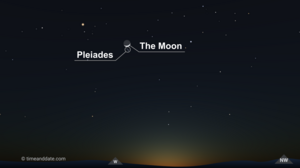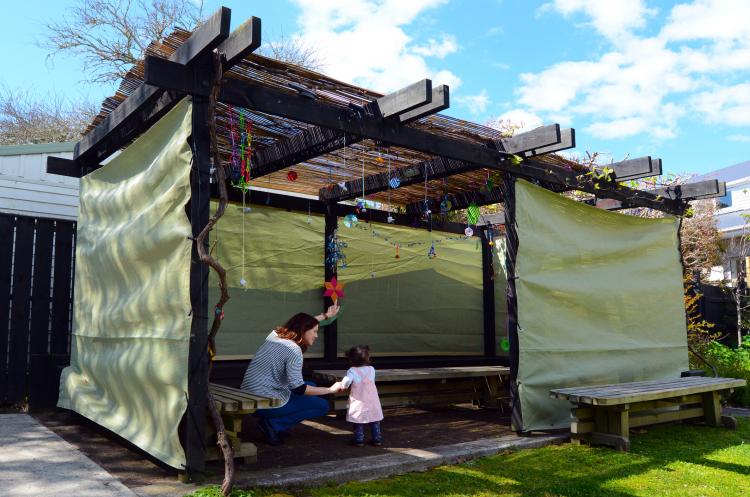
The Crescent Moon Meets the Pleiades
On April 1, don't miss the Crescent Moon cozying up to the Pleiades star cluster.
Jewish people in the United Kingdom celebrate Hoshana Rabbah (or Hoshana Raba) as the last day of the Sukkot festival.

Family sukkah
©iStockphoto.com/chameleonseye
Hoshana Rabbah is the seventh and final day of the Sukkot period. It is marked on the 21st day of Tishrei, which is the seventh month of the Jewish calendar. It falls in September or October in the Gregorian calendar.
No, Hoshana Rabbah is not a bank holiday in the United Kingdom. However, Jewish businesses, organizations, and schools may be closed during the seven days of the Sukkot festival.
During Sukkot, Jewish people in the UK and around the world are expected to spend as much time as possible in a sukkah, a temporary hut or booth, to commemorate God's protection of the Israelites during their escape from Egypt, as told in the Book of Exodus.
A ritual called the Four Kinds is performed on each of the seven days. It involves holding and waving four types of plants: lulav (a green, closed frond of a date palm tree), hadass (twigs and leaves from a myrtle tree), aravah (twigs and leaves from a willow tree), and etrog (a lemon-like fruit of the citron tree). Hoshana Rabbah involves the same rituals—however, on this day, another willow branch is added.
There are special services in synagogues across the UK, where Hoshanot prayers are recited and the Torah scrolls are taken out of the Ark and circled seven times by the worshippers.
On Hoshana Rabbah, Jewish people retreat to the sukkah for a festive meal. This usually involves challah bread dipped in honey. In some communities, it is customary to eat Kreplach on this day, dough triangles filled with ground beef or chicken.
Hoshana Rabbah is known as the day of the final sealing of judgment, which began on Rosh Hashanah. According to Jewish tradition, God's judgment determines the fortune of the coming year.
It is the final day of Sukkot, which is both an agricultural festival marking the end of the harvest in Israel and a religious observance commemorating God's protection of the Israelites during their escape from Egypt.
Following Hoshana Rabbah, Jewish people celebrate two more holidays: Shemini Atzeret and Simchat Torah. On these days, they may still use the sukkah but they are not expected to carry out the ritual of the Four Kinds.
In the UK and all other countries except Israel, Shemini Atzeret falls on the 8th day after the beginning of Sukkot and Simchat Torah occurs on the 9th day. In Israel, both fall on the 8th day.
The United Kingdom is estimated to have the 5th largest Jewish population in the world, with just under 300,000 people practicing the Jewish faith in the country. By far the largest British Jewish community is found in London, followed by those in Manchester and Leeds.
Jewish settlement in England can be traced as far back as the time of the Norman Conquest in 1066. The Jewish community outnumbered the Spanish and Portuguese communities in England by the 18th century.
Many Jewish families in Eastern Europe moved to England to escape persecution and hardship between 1881 and 1914. About 150,000 Jewish people settled in England, with large numbers staying at London's East End during that time. England continued to receive Jewish immigrants escaping persecution around the time of World War II (1939-1945).
In the Jewish diaspora—Jewish communities outside of Israel—an extra day is usually added to religious observances, with the exception of Yom Kippur, which lasts only one day worldwide, and Rosh Hashana, which is celebrated over two days in both Israel and the diaspora.
This custom has its roots in ancient times when the beginning of the months in the Jewish calendar still relied on the sighting of the crescent Moon following a New Moon.
The beginning of a new month was determined by the Sanhedrin, the supreme court of ancient Israel in Jerusalem. Once the date was published, messengers were dispatched to spread the news among Jews living abroad. Since this process took some time, it was decreed that Jews outside of ancient Israel were to observe every holiday for 2 days to make sure that the rules and customs applicable to each holiday were observed on the proper date. This rule is still observed today.
Note: Jewish holidays begin at sundown the day before the date specified for the holiday.
| Year | Weekday | Date | Name | Holiday Type |
|---|---|---|---|---|
| 2020 | Fri | Oct 9 | Hoshana Rabbah | Jewish Holiday |
| 2021 | Mon | Sep 27 | Hoshana Rabbah | Jewish Holiday |
| 2022 | Sun | Oct 16 | Hoshana Rabbah | Jewish Holiday |
| 2023 | Fri | Oct 6 | Hoshana Rabbah | Jewish Holiday |
| 2024 | Wed | Oct 23 | Hoshana Rabbah | Jewish Holiday |
| 2025 | Mon | Oct 13 | Hoshana Rabbah | Jewish Holiday |
| 2026 | Fri | Oct 2 | Hoshana Rabbah | Jewish Holiday |
| 2027 | Fri | Oct 22 | Hoshana Rabbah | Jewish Holiday |
| 2028 | Wed | Oct 11 | Hoshana Rabbah | Jewish Holiday |
| 2029 | Sun | Sep 30 | Hoshana Rabbah | Jewish Holiday |
| 2030 | Fri | Oct 18 | Hoshana Rabbah | Jewish Holiday |
While we diligently research and update our holiday dates, some of the information in the table above may be preliminary. If you find an error, please let us know.

On April 1, don't miss the Crescent Moon cozying up to the Pleiades star cluster.

Explore how the Sun’s solar maximum phase could impact aurora colors in 2025. Find out the science behind these stunning light displays.

Discover the phases of the Moon in April 2025, including a Micro Full Moon and a Super New Moon.

Telling time is harder than you think—discover the quirks, history, and challenges behind keeping the world on schedule.